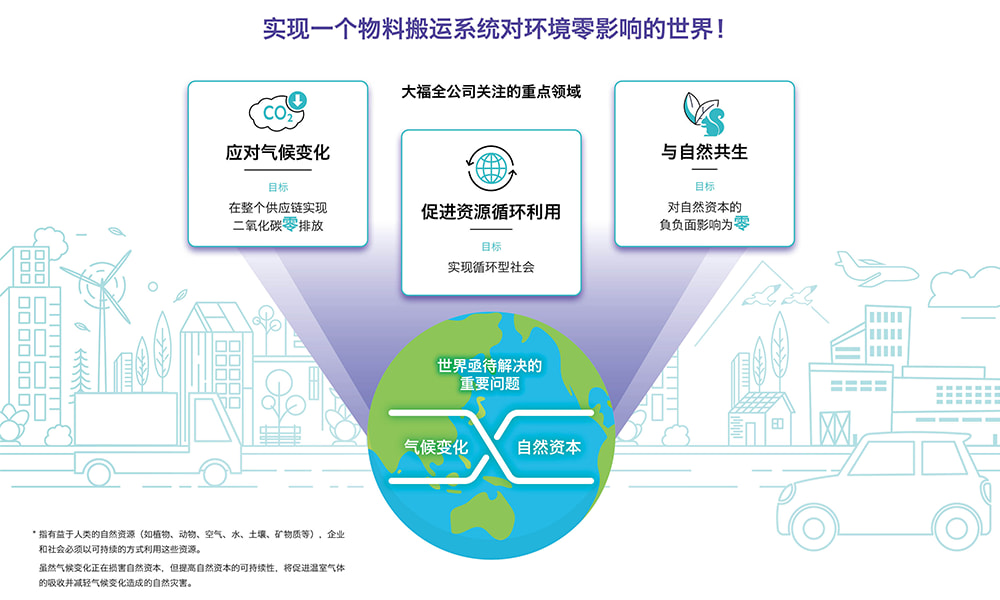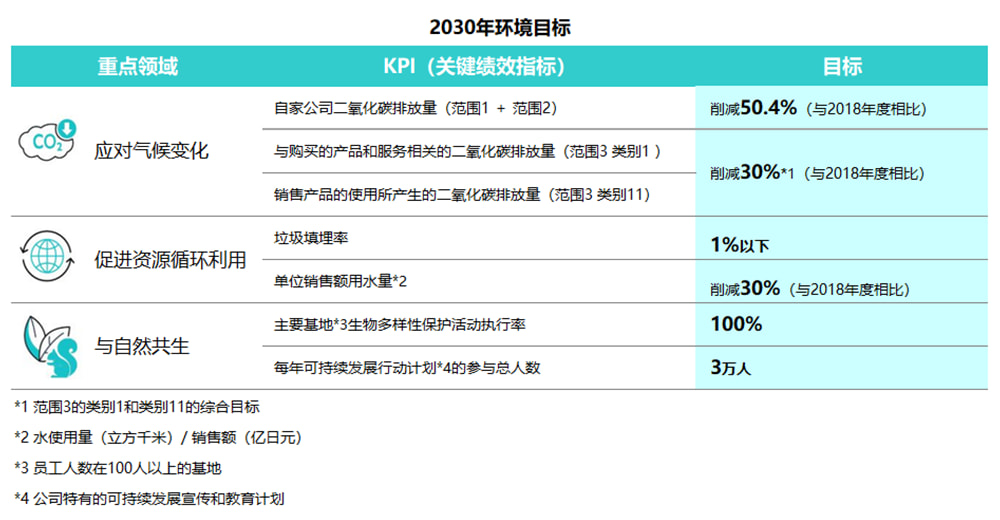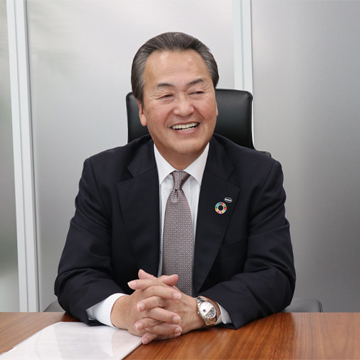Revising the Daifuku Environmental Vision 2050: Helping Realize a World Where Material Handling Systems Operate with Zero Environmental Impact
The Daifuku Environmental Vision 2050 (hereinafter the Vision), which establishes Daifuku’s policies and goals related to environmental issues, was revised in May 2023. As climate change and other environmental challenges become more pressing, these revisions are intended to ensure concrete action at higher levels to eliminate the net environmental impact of material handling systems. The Vision outlines Daifuku’s dedication to fulfilling our responsibilities throughout the supply chain while keeping an eye toward the society of tomorrow we are trying to make possible.
Three priority areas identified under natural capital
Daifuku’s management philosophy is “Automation that Inspires.” Under this philosophy, we are dedicated to creating a society in which everyone in the world can live enriched lives. To realize such a society, we must pioneer the development and supply of next-generation logistics systems while simultaneously protecting the health of the global environment. To do so, in May 2023 we revised the Daifuku Environmental Vision 2050 (first adopted in 2021) to include newly established policies and targets for reducing the company’s environmental impact.

In the Vision, Daifuku has set a goal to realize a world where material handling systems operate with zero environmental impact. Toward that goal, we have incorporated a natural capital perspective to the previous iteration of the Vision and identified three priority areas to address: climate change, resource recycling, and coexisting with nature. We have also raised the numerical targets for achieving these goals. Regarding the reasons for these revisions, Hideaki Takubo, Director and Managing Officer, and head of sustainability at Daifuku, had this to say: “In recent years, we have seen accelerated efforts toward carbon neutrality across the globe, as well as increased awareness of the impacts on biodiversity and natural capital caused by economic activity, and of the risk of erosion to corporate value for not addressing environmental concerns. These revisions are intended to ensure concrete action at higher levels in light of changing societal demands.”
Revisions to support environmental responsiveness
The Daifuku Group supports and complies with various agreements, laws, and regulations relating to climate change, including the Paris Agreement adopted at the UN Climate Change Conference (COP21) in 2015, the 1979 Act on Rationalizing Energy Use, which was enacted in response to the oil crisis, and the 1998 Act on Promotion of Global Warming Countermeasures.
One specific effort is Daifuku’s dedication to providing environmentally friendly products. For example, we have developed products that use regenerative energy * to minimize energy consumption for stacker cranes in automatic storage and retrieval systems. In fiscal 2013, we installed a solar farm with a maximum generation capacity of 4,438 kW at Shiga Works, Daifuku’s flagship production site in Shiga, Japan. Thanks in part to the power produced by this farm, all electricity used at this facility since fiscal 2022 has been entirely from renewable energy.
- *Energy generated during deceleration of vehicles and other equipment
We have also expressed our support for the recommendations set forth by the Task Force on Climate-related Financial Disclosures (TCFD), and in fiscal 2020, we announced our analyze on climate-related risks and opportunities based on TCFD recommendations.
In addition, our commitment extends beyond only environmental issues to include social issues throughout our supply chain. Topics, such as human rights, are addressed by the Daifuku Group’s Sustainability Committee, which is chaired by the CEO and includes top executives from each business unit. The committee works diligently to formulate relevant Group-side policies and initiatives. The Daifuku Environmental Vision 2050 was one result of such efforts. The Committee also oversees the progress of these initiatives and reports any notable matters to the Board of Directors.
Strengthening global initiatives to achieve loftier goals
The most recent revisions to the Vision are the result of the Daifuku Group’s dedication to achieving its vision of the future. As we accelerate our global efforts to address environmental challenges, we have no intention of stopping at our current targets and will continue setting ever-higher goals as we find the previous ones in reach. Through this we will continuously increase our contributions toward solving environmental issues. These adjustments are all part of our constant pursuit of the society of tomorrow we are trying to make possible.

One of the key areas in the Vision is addressing climate change, and toward that goal Daifuku aims to achieve net zero CO2 emissions from business activities throughout the supply chain. Based on the 1.5°C limit set in the Paris Agreement, the current revision increases Daifuku’s CO2 emissions reduction target for 2030 * (total from Scope 1 and Scope 2 emissions) from 25% or more to 50.4%. We also set a new reduction target of 30% * for all CO2 emissions related to purchased products and services and their use (Scope 3 emissions).
- *Compared with FY2018 levels
Head of sustainability Mr. Takubo noted the following: “Currently, the Daifuku Group is focusing on introducing renewable energy and energy conservation efforts at our locations globally, and we are confident we can reduce our CO2 emissions in line with the plan to a certain extent. However, looking at the breakdown of CO2 emissions, we see that a large percentage comes from procurement activities and the operation of our products. As such, we must work more closely with customers and suppliers to meet our goal of net zero emissions throughout the entire supply chain.”
Daifuku is also dedicated to ensuring sustainable use of resources and reducing use where possible, as well as helping establish a recycling-oriented society by extending the service life of our products, minimizing waste, and expanding the recycling of used products and parts.
We recognize the impact our business activities have on the global environment, and are dedicated to minimizing all negative impacts on natural capital while striving to coexist with nature. At Daifuku’s Shiga Works, a location surrounded by a rich natural environment, we cultivate a special sense of coexistence with nature through initiatives such as the Yui Project. Started in 2014, the project has the goal of preserving the biodiversity of the vast 1.2 million square meters of land around the plant. Our targets for 2030 are designed to enhance and expand these efforts globally.
Outside Director Yoshiaki Ozawa had this to say about the revisions: “We feel that the revised content is comparable to the policies of other companies and the Ministry of the Environment. And while the Vision outlines what the Company wants to achieve, however, without a set methodology and concrete plans to achieve those goals, the Vision is nothing more than wishful thinking. To ensure we achieve the goals set forth in the Vision, we must focus on promoting initiatives at our locations globally, as 70% of the Daifuku Group’s revenue and workforce is located outside of Japan.”
Enriching society by solving customer challenges and contributing to the global environment
Daifuku has always considered addressing environmental issues the responsibility of those involved in business activities that utilize natural resources and energy. We consider the harmonization and improvement of economic value and social value to be our mission.

President and CEO Hiroshi Geshiro adds, “To create a society where people around the world can live enriched lives, we must first protect the health of the global environment. At Daifuku, we believe that addressing climate change and other environmental issues is an essential management responsibility. In addition to investing in solar power and other methods for reducing our impact on the environment, all of us in the Daifuku Group must recognize the importance of environmental issues in our daily tasks and responsibilities. Doing so will allow us not only to accelerate the Group’s efforts toward reducing environmental impact globally, but also to strengthen collaboration with customers and suppliers to help achieve zero environmental impact in all material handling system operations.”
To achieve the Daifuku Environmental Vision 2050, the Daifuku Group is committed to addressing environmental issues throughout the supply chain and to engaging with customers, suppliers, investors, and other stakeholders.


